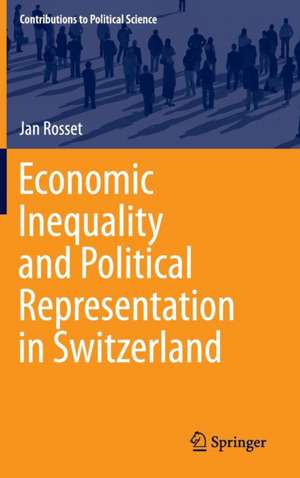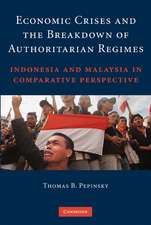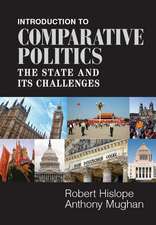Economic Inequality and Political Representation in Switzerland: Contributions to Political Science
Autor Jan Rosseten Limba Engleză Hardback – 31 mar 2016
| Toate formatele și edițiile | Preț | Express |
|---|---|---|
| Paperback (1) | 380.25 lei 6-8 săpt. | |
| Springer International Publishing – 25 apr 2018 | 380.25 lei 6-8 săpt. | |
| Hardback (1) | 387.58 lei 6-8 săpt. | |
| Springer International Publishing – 31 mar 2016 | 387.58 lei 6-8 săpt. |
Din seria Contributions to Political Science
- 18%
 Preț: 724.17 lei
Preț: 724.17 lei - 24%
 Preț: 633.39 lei
Preț: 633.39 lei - 17%
 Preț: 524.54 lei
Preț: 524.54 lei - 15%
 Preț: 583.61 lei
Preț: 583.61 lei -
 Preț: 380.63 lei
Preț: 380.63 lei - 15%
 Preț: 471.69 lei
Preț: 471.69 lei - 18%
 Preț: 780.82 lei
Preț: 780.82 lei - 18%
 Preț: 785.86 lei
Preț: 785.86 lei -
 Preț: 379.86 lei
Preț: 379.86 lei - 15%
 Preț: 695.85 lei
Preț: 695.85 lei -
 Preț: 390.84 lei
Preț: 390.84 lei - 18%
 Preț: 777.50 lei
Preț: 777.50 lei -
 Preț: 387.75 lei
Preț: 387.75 lei - 18%
 Preț: 791.71 lei
Preț: 791.71 lei -
 Preț: 394.29 lei
Preț: 394.29 lei - 15%
 Preț: 635.15 lei
Preț: 635.15 lei -
 Preț: 381.42 lei
Preț: 381.42 lei - 18%
 Preț: 798.66 lei
Preț: 798.66 lei -
 Preț: 392.37 lei
Preț: 392.37 lei -
 Preț: 391.02 lei
Preț: 391.02 lei -
 Preț: 359.76 lei
Preț: 359.76 lei - 18%
 Preț: 788.90 lei
Preț: 788.90 lei -
 Preț: 395.47 lei
Preț: 395.47 lei - 20%
 Preț: 579.41 lei
Preț: 579.41 lei - 15%
 Preț: 643.34 lei
Preț: 643.34 lei -
 Preț: 384.86 lei
Preț: 384.86 lei -
 Preț: 487.57 lei
Preț: 487.57 lei - 18%
 Preț: 781.62 lei
Preț: 781.62 lei - 18%
 Preț: 734.09 lei
Preț: 734.09 lei - 15%
 Preț: 645.79 lei
Preț: 645.79 lei - 15%
 Preț: 698.62 lei
Preț: 698.62 lei -
 Preț: 396.62 lei
Preț: 396.62 lei - 15%
 Preț: 584.26 lei
Preț: 584.26 lei - 18%
 Preț: 727.80 lei
Preț: 727.80 lei -
 Preț: 393.35 lei
Preț: 393.35 lei - 15%
 Preț: 651.84 lei
Preț: 651.84 lei
Preț: 387.58 lei
Nou
Puncte Express: 581
Preț estimativ în valută:
74.17€ • 76.62$ • 61.73£
74.17€ • 76.62$ • 61.73£
Carte tipărită la comandă
Livrare economică 25 martie-08 aprilie
Preluare comenzi: 021 569.72.76
Specificații
ISBN-13: 9783319271156
ISBN-10: 3319271156
Pagini: 182
Ilustrații: IX, 149 p. 3 illus.
Dimensiuni: 155 x 235 x 11 mm
Greutate: 0.4 kg
Ediția:1st ed. 2016
Editura: Springer International Publishing
Colecția Springer
Seria Contributions to Political Science
Locul publicării:Cham, Switzerland
ISBN-10: 3319271156
Pagini: 182
Ilustrații: IX, 149 p. 3 illus.
Dimensiuni: 155 x 235 x 11 mm
Greutate: 0.4 kg
Ediția:1st ed. 2016
Editura: Springer International Publishing
Colecția Springer
Seria Contributions to Political Science
Locul publicării:Cham, Switzerland
Public țintă
ResearchCuprins
Introduction.- Electoral Democratic Representation and the Market Economy: Irreconcilable Assumptions, Driving Forces and Outcomes.- Explaining Unequal Representation.- Empirical Study of Unequal Representation in Switzerland: Towards an Analytical Framework.- Unequal Representation in Switzerland.- Unequal Representation by Parties: Explanations Based on the Elites' Side of the Representation Process.- The Structure of Party Competition and Electoral Choice: Explanations Based on the Electoral Behavior of Citizens.- The Moderating Effect of Party Finance Regulations.- Conclusion.
Notă biografică
Jan Rosset is a post-doctoral researcher at the Mannheim Centre for European Social Research (MZES), University of Mannheim, with a fellowship from the Swiss National Science Foundation. Prior to that, he has worked as senior researcher at FORS, the Swiss Centre of Expertise in the Social Sciences, and as lecturer at the University of Lausanne. He received his PhD in political science from this latter institution in 2013. His research interests include comparative politics, political representation and the link between economic and political inequality.
Textul de pe ultima copertă
This book analyzes the link between economic and political inequalities and investigates the mechanisms that lead to economically rooted inequalities in the political representation of citizens’ policy preferences. Focusing on the case of Switzerland and evaluating data from the post-electoral survey, Selects 2007, the author demonstrates that the policy preferences of members of the Federal Assembly best reflect those of rich citizens. This pattern is explained by differential levels of political participation and knowledge across income groups, party finance, the fact that representatives tend to come from higher economic strata, and the failure of the party-system structure to reflect the complexity of policy preferences among citizens.
Caracteristici
Investigates economically rooted inequalities in the political representation of citizens’ policy preferences Offers new theories on why wealthy citizens’ voices are better heard Based on data from a survey of more than 3000 citizens and 1500 candidates running in parliamentary elections

















